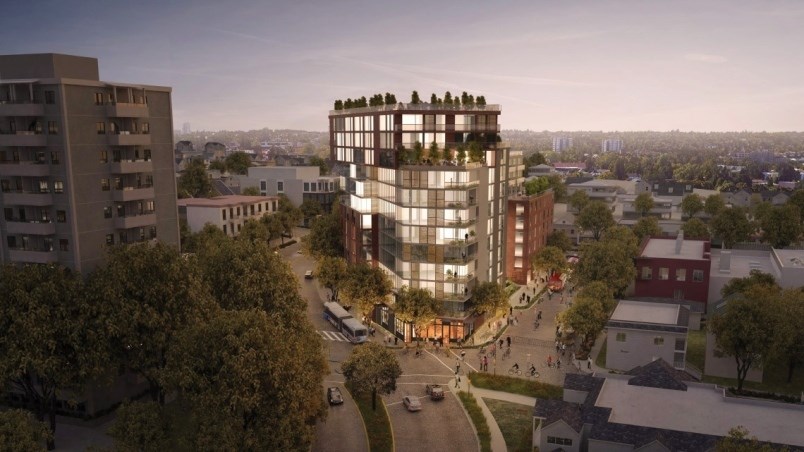A plan to redevelop a site at Venables and Commercial Drive, which could have produced 30 supportive housing units, a drop-in centre for people with mental health concerns and market condo units, has been scrapped.
The proponents behind the Kettle-Boffo project say the expectation of a cash CAC (community amenity contribution) of between $6 and 16 million killed the project.
Nancy Keough, executive director of the Kettle Society, and Daniel Boffo, principal of Boffo Properties, announced the decision in a June 19 online post.
“[I’m] deeply disappointed. It’s a bit surreal [for] a project like ours that had everything going for it — community support, council support. It was unfortunate that it failed,” Boffo told the Courier June 19.
Keough is equally discouraged. She said the expectation of the cash CAC made the project a no-go because the Kettle Society and Boffo had considered the benefits of 30 housing units and a new drop-in centre to be the contribution to the community.
“I thought we had won the battle. I was so excited with all the community support… All I can say is I’m so disappointed, not just for the Kettle but for all our clients. The drop-in needs to be rebuilt and [it was] housing for people that had been waiting for years,” she said. “We’ve hit the end of the road. For us, we’ve invested all these years in trying to make it happen and it’s not going to happen with that CAC.”
Keough called it a lost opportunity and said the city needs to look at its processes and figure out a way to make it happen.
The project
The Kettle Society owns its building at 1725 Venables St., which provides housing and support to people with mental illness. The non-profit has said it needs to expand because it lacks enough private space for patient counselling, sufficient room for clients’ meals and overall space to provide other services and support.
Since the organization couldn’t get money from higher levels of government to expand, it forged an arrangement with Boffo Properties for the project.
Boffo Properties owns buildings on either side of the Kettle Society building — the former Astorino’s location and the dry cleaning site at the southwest corner. The city owns the parking lot to the north. Boffo had discussions with the city to amalgamate the parking lot with the redevelopment.
In 2016, council approved the Grandview-Woodland community plan, which included a clause that allows council to consider up to 12 storeys on the Kettle-Boffo site.
Staff had considered scaling it back to nine storeys in response to some residents’ complaints about the redevelopment proposal being too high and too dense, but project proponents argued it wasn’t viable at a lower height.
The vision for the redevelopment in 2016 was for 200 one- to three-bedroom market housing units, 30 supportive housing units for the Kettle Society to own and operate and a larger space for its other services.
Preliminary renderings had been released but a rezoning application hadn’t been filed.
Boffo said the project had been in the works since 2011 when they submitted a zoning letter of inquiry to the city, after which they were working through the Grandview-Woodland community planning process.
“Our 12-storey proposal was great because it had no cost to taxpayers and provided a huge community public benefit that was in the range of $39-plus million when you average it all out,” he said.
“We’ve been working two years, in some cases with the city — we had other challenges as well — but the real challenge was the CAC process. We were not successful in being able to move through that. It’s a flawed process that needs to be changed,” he said.
Boffo maintains there needs to be a more “collaborative, transparent and clear process” for the review of the pro forma.
“We found there was a lack of consistency along the process and [it was] constantly chasing moving goal posts,” he said.
“When you’ve worked through a project like ours for seven years and [it was] a project that had everything going for it — if ours can’t succeed, you wonder whose can. The difference with our project is we put no burden on the taxpayer. It was a wonderful non-profit partnership with [us], with the two of us working with the government to be able to expand housing options — both market and non-market. What gets forgotten a lot is the mental health services that the Kettle provides to the community. Sometimes in the conversation of housing, we forget the mental health crisis that we’ve been working through as well.
City of Vancouver weighs in
Gil Kelley, the city’s chief planner, said the developer didn’t file a rezoning application. Discussions that led up to the proponents’ decision to cancel the project had been pre-application consultation conversations.
“The importance of that is many of the costs and so forth are not really known until you get into the details of reviewing the application with all of the departments,” he said, adding the city had offered to provide what amounted to a $12-million grant to the Kettle Society as part of the project to make it work.
“That would have been deducted from any eventual CAC amount... then the city would require some additional contribution, as it always does, from the private development side of it. The developer and the Kettle, together, decided that where those initial numbers resided was not acceptable to them and that’s their choice. We remain open to discussions with the Kettle or any of the partners to find a way through, including the Kettle and any partner it wants to engage.”

City manager Sadhu Johnston echoed Kelley’s remarks, stressing the city had been asking the developer to pursue an application so formal negotiations could begin.
“They never did that for some reason. That was a bit of a quandary for us. Despite that, we entered into discussions about the sale price for the [city] land because we needed to contribute our land to it. We started to talk about ways we could reinvest the CACs into the project. Those were all things that council was prepared to do.”
Johnston said it’s the city’s expectation that every developer kicks in “their fair share” to enable amenities in the community.
He also said the city is committed to helping create more social housing units and it has responded to calls to reform the CAC process.
Last year, it implemented fixed-rate CACs for commercial and rental projects, however there are complicated projects, such as the Kettle-Boffo one, where negotiations are necessary.
“It is our job as public servants to defend the public good and to make sure developers are delivering their fair share in these projects. We didn’t get there yet with this project,” he said.
“We’re disappointed they’ve decided not to proceed. We think the Kettle is a really great partner. We have the land still and we actually will approach them about doing a separate project without the developer, just with the city, to see if we can still deliver on the benefits to that community of what the Kettle offers.”



